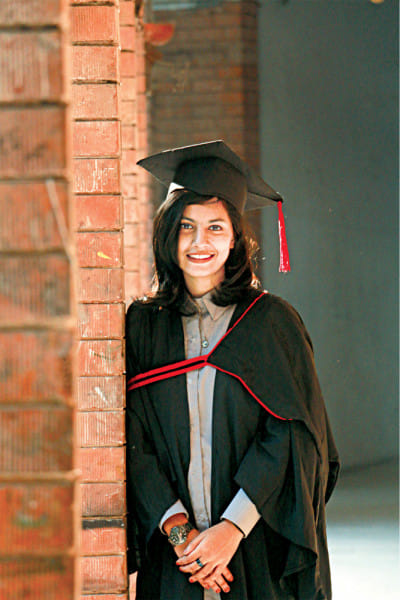Digitising Bengali

Sazia Mehnaz, a former student of the Department of Linguistics at Dhaka University, recently won an international award for her research work on the Bengali language. For her postgraduate research on 'Cognitive Challenges of Anaphora: A Study on Bengali Pronominal Expression', she was recently awarded the Outstanding Corpus Thesis Award from Incheon National University, South Korea.
In linguistics, anaphora is the use of an expression whose interpretation depends upon another expression in context, mainly a figure of speech in which words repeat at the beginning of successive clauses, phrases, and sentences. Anaphora resolution, which means resolving what a pronoun or noun phrase refers to, is one of the most important areas in Natural Language Processing.
To detect certain ambiguities, machines must learn an algorithm, which is generated by humans. Sazia followed Hobbs' algorithm to detect Bangla anaphora and explored the basics of Bengali pronominal expressions. Previous research on anaphora resolution in Bangladesh was done from a Computer Science-based perspective, whereas Sazia focused on approaching her research from the perspective of Linguistics. Professor Dr Syed Shahrier Rahman was Sazia's supervisor during the research tenure.
Often, when using Bengali on certain machines, there are several ambiguities seen in the usage of nouns and pronouns. Sazia's research aimed to overcome such adversities. Her work shows the promise of making the day-to-day usage of language easier in our modern world. For example, in space travels, certain signals could be detected from spacecrafts that could enhance and specify communication techniques. As a result, detecting these ambiguities will open up further opportunities to communicate in different languages such as Bengali, opening up more prospects for native Bengali speakers.
"I wanted to work on a topic combining natural language processing and linguistics for my thesis. There are many ambiguities when it comes to the use of nouns and pronouns in Bengali. Through my research, we can understand why those ambiguities arise and how we can overcome them," shares Sazia, who is an Associate Linguist at a private software company. "This is just a basic research project. It will be completed after an extensive and more detailed process, with enough data and resources. While other languages are being modernised day by day, Bengali is still lagging when it comes to digitisation. To digitise Bengali, we will need a richer and more developed corpus to further broaden aspects of research in this field."
Sazia completed her Master's with first-class second position, on the merit list. She plans to go for higher studies in Computational Linguistics.
"I want to thank my family, teacher and my loved ones for supporting me throughout the process," adds Sazia. As research on Bengali linguistics is quite limited, Sazia's work will further inspire others to contribute in this field. More research on Bengali will further help to preserve and protect our mother tongue.

 For all latest news, follow The Daily Star's Google News channel.
For all latest news, follow The Daily Star's Google News channel. 



Comments